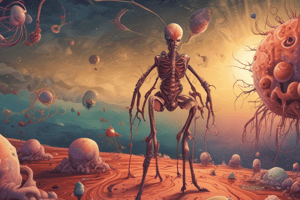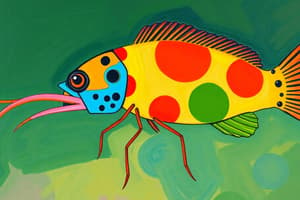Podcast
Questions and Answers
What is the primary purpose of performing the skin snips technique?
What is the primary purpose of performing the skin snips technique?
- To assess the overall health of the skin
- To provide a sample for blood testing
- To identify the presence of microfilariae (correct)
- To evaluate skin hydration levels
Which staining methods can be used to differentiate microfilariae after the skin snip procedure?
Which staining methods can be used to differentiate microfilariae after the skin snip procedure?
- Giemsa or Papanicolaou staining
- Lactophenol cotton blue or H & E staining
- Gram staining or Giemsa staining
- Hematoxylin and eosin or Giemsa staining (correct)
What reaction is provoked by administering 50 mg of DEC in the Mazzotti test if microfilariae are present?
What reaction is provoked by administering 50 mg of DEC in the Mazzotti test if microfilariae are present?
- Severe itching as an allergic response (correct)
- A mild rash without itching
- Swelling in the lymph nodes
- No reaction at all
What is an accurate measure of infection endemicity in a community derived from skin snips technique?
What is an accurate measure of infection endemicity in a community derived from skin snips technique?
Which locations are most common for obtaining skin samples using the skin snips technique?
Which locations are most common for obtaining skin samples using the skin snips technique?
What percentage of onchocerciasis cases are found in Africa?
What percentage of onchocerciasis cases are found in Africa?
Which of the following is a common early sign of Onchocerca infection?
Which of the following is a common early sign of Onchocerca infection?
Which fly is responsible for transmitting the infective larvae of Onchocerca?
Which fly is responsible for transmitting the infective larvae of Onchocerca?
What is the average lifespan of adult Onchocerca worms in nodules?
What is the average lifespan of adult Onchocerca worms in nodules?
What clinical presentation can result from the migration of microfilaria into the eye?
What clinical presentation can result from the migration of microfilaria into the eye?
Which anatomical structure do adult Onchocerca worms encapsulate within?
Which anatomical structure do adult Onchocerca worms encapsulate within?
What is the typical length and diameter of microfilariae of Onchocerca?
What is the typical length and diameter of microfilariae of Onchocerca?
Which of the following is NOT a type of inflammatory dermatitis associated with Onchocerca infection?
Which of the following is NOT a type of inflammatory dermatitis associated with Onchocerca infection?
Flashcards
Onchocerca volvulus
Onchocerca volvulus
A parasitic nematode that causes river blindness.
River blindness
River blindness
A parasitic disease, transmitted by black flies, causing skin and eye damage.
Microfilariae
Microfilariae
Immature parasitic worms, found in the skin and eyes.
Onchocercoma
Onchocercoma
Signup and view all the flashcards
Skin snips
Skin snips
Signup and view all the flashcards
Ocular onchocerciasis
Ocular onchocerciasis
Signup and view all the flashcards
Black Flies
Black Flies
Signup and view all the flashcards
Clinical presentation
Clinical presentation
Signup and view all the flashcards
Skin Snips Technique
Skin Snips Technique
Signup and view all the flashcards
Microfilariae emergence
Microfilariae emergence
Signup and view all the flashcards
Mazzotti test
Mazzotti test
Signup and view all the flashcards
Skin biopsy sites
Skin biopsy sites
Signup and view all the flashcards
Skin Snip Procedure
Skin Snip Procedure
Signup and view all the flashcards
Study Notes
Onchocerca Volvulus (River Blindness)
- Approximately 96% of cases occur in Africa, specifically in Northern Sudan (Abo-hamad, Nahr Atbara, and Nahr Eljour).
- The infective larvae (L3) are transmitted by black flies (Simulium damnosum) near fast-running rivers.
- Adult worms are encapsulated within nodules in subcutaneous tissues.
Morphology
- Microfilariae are 300 µm long and 0.8 µm in diameter.
- They lack sheaths and have sharply pointed, curved tails.
- There are no nuclei at the tail end, and the head is slightly enlarged.
- Adult females are 45-50 cm by 300 µm, and males are 20-40 mm by 200 µm.
- Adults live for 8-10 years in nodules (onchocercomas).
- The cuticle has transverse striations with annular and oblique thickenings, which distinguishes it from other filarial worms.
Life Cycle
- Blackflies (blood meal) ingest microfilariae.
- Microfilariae migrate to the blackfly's thoracic muscles.
- Infective L3 larvae enter the bite wound.
- Microfilariae migrate to subcutaneous tissues, forming nodules.
- Adults produce microfilariae that circulate in skin, lymphatic fluids, and occasionally in blood, urine, and sputum.
Clinical Presentation
- An early indicator is the raised skin nodules (onchocercomas).
- Inflammatory dermatitis can manifest as papules, tissue paper-like skin, hypo-pigmentation (leopard skin, lizard skin), skin thickening (elephant skin), and hyper-pigmentation (Swada or black disease—first reported in Yemen).
- Loss of elasticity in the skin around the groin can lead to a hanging groin.
Ocular Onchocerciasis
- Migration of microfilariae to the eye leads to corneal and anterior chamber involvement.
- Symptoms include photophobia, lacrimation, chronic conjunctivitis, opacity, and synechiae, possibly progressing to blindness.
Lab Diagnosis
- Skin snips: Sterile needle extracts skin tissue and saline solution to reveal microfilariae.
- ELISA and PCR tests detect microfilariae.
- Onchocerca skin card testing for IgG antibodies.
Skin Snips Technique
- Commonly performed on iliac crests or calves/shoulders.
- A small piece of skin (1-3 mm) is excised.
- The biopsy is incubated in saline to release microfilariae (60% within 30 minutes, 75% within 24 hours).
- Microscopy, Giemsa or H&E staining, and microfilariae counting per mg of skin to determine prevalence.
Mazzotti Test
- A 50 mg DEC oral dose (for suspected presence of microfilariae); a severe itching reaction within 2 hours indicates microfilariae presence due to allergic reactions.
- The test is used only when necessary due to discomfort, and a topical cream (Nivea) containing DEC can be used as an alternative.
Studying That Suits You
Use AI to generate personalized quizzes and flashcards to suit your learning preferences.




